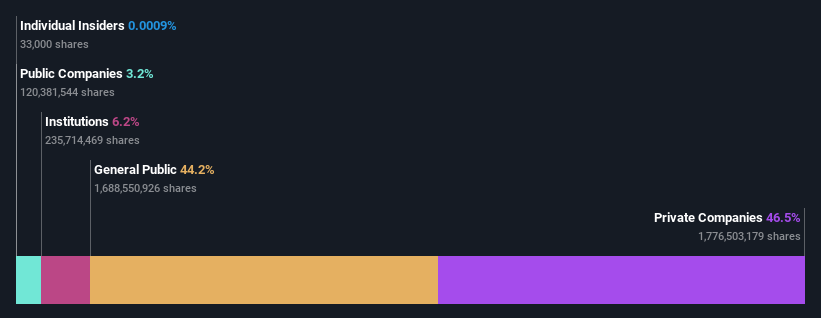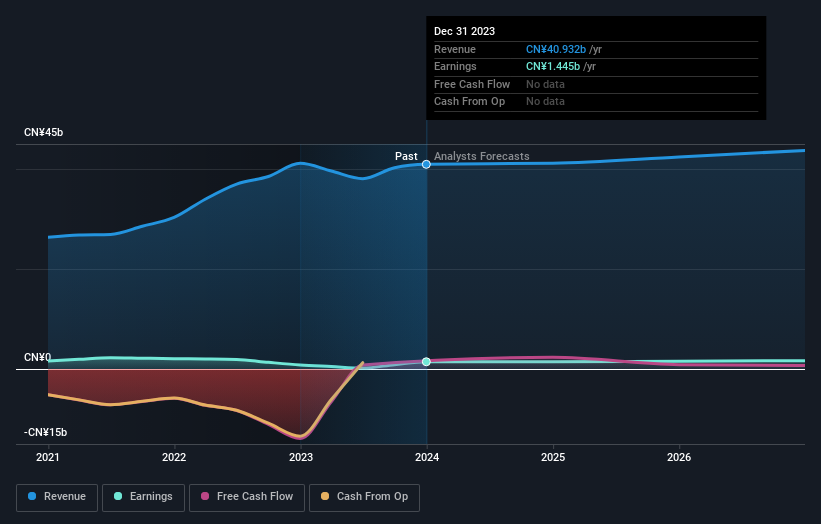Stock Analysis
- Hong Kong
- /
- Real Estate
- /
- SEHK:119
Private companies are Poly Property Group Co., Limited's (HKG:119) biggest owners and were hit after market cap dropped HK$420m

Key Insights
- Poly Property Group's significant private companies ownership suggests that the key decisions are influenced by shareholders from the larger public
- 50% of the business is held by the top 4 shareholders
- Ownership research, combined with past performance data can help provide a good understanding of opportunities in a stock
If you want to know who really controls Poly Property Group Co., Limited (HKG:119), then you'll have to look at the makeup of its share registry. With 46% stake, private companies possess the maximum shares in the company. In other words, the group stands to gain the most (or lose the most) from their investment into the company.
And following last week's 8.1% decline in share price, private companies suffered the most losses.
In the chart below, we zoom in on the different ownership groups of Poly Property Group.
Check out our latest analysis for Poly Property Group

What Does The Institutional Ownership Tell Us About Poly Property Group?
Many institutions measure their performance against an index that approximates the local market. So they usually pay more attention to companies that are included in major indices.
As you can see, institutional investors have a fair amount of stake in Poly Property Group. This suggests some credibility amongst professional investors. But we can't rely on that fact alone since institutions make bad investments sometimes, just like everyone does. If multiple institutions change their view on a stock at the same time, you could see the share price drop fast. It's therefore worth looking at Poly Property Group's earnings history below. Of course, the future is what really matters.

We note that hedge funds don't have a meaningful investment in Poly Property Group. Our data shows that China Poly Group Corporation Limited is the largest shareholder with 36% of shares outstanding. WP Source Limited is the second largest shareholder owning 9.2% of common stock, and Poly Developments and Holdings Group Co., Ltd. holds about 3.2% of the company stock.
Our research also brought to light the fact that roughly 50% of the company is controlled by the top 4 shareholders suggesting that these owners wield significant influence on the business.
While it makes sense to study institutional ownership data for a company, it also makes sense to study analyst sentiments to know which way the wind is blowing. There is a little analyst coverage of the stock, but not much. So there is room for it to gain more coverage.
Insider Ownership Of Poly Property Group
The definition of company insiders can be subjective and does vary between jurisdictions. Our data reflects individual insiders, capturing board members at the very least. The company management answer to the board and the latter should represent the interests of shareholders. Notably, sometimes top-level managers are on the board themselves.
Most consider insider ownership a positive because it can indicate the board is well aligned with other shareholders. However, on some occasions too much power is concentrated within this group.
Our information suggests that Poly Property Group Co., Limited insiders own under 1% of the company. But they may have an indirect interest through a corporate structure that we haven't picked up on. It seems the board members have no more than HK$41k worth of shares in the HK$4.8b company. We generally like to see a board more invested. However it might be worth checking if those insiders have been buying.
General Public Ownership
With a 44% ownership, the general public, mostly comprising of individual investors, have some degree of sway over Poly Property Group. While this group can't necessarily call the shots, it can certainly have a real influence on how the company is run.
Private Company Ownership
We can see that Private Companies own 46%, of the shares on issue. It might be worth looking deeper into this. If related parties, such as insiders, have an interest in one of these private companies, that should be disclosed in the annual report. Private companies may also have a strategic interest in the company.
Public Company Ownership
We can see that public companies hold 3.2% of the Poly Property Group shares on issue. It's hard to say for sure but this suggests they have entwined business interests. This might be a strategic stake, so it's worth watching this space for changes in ownership.
Next Steps:
While it is well worth considering the different groups that own a company, there are other factors that are even more important. Consider for instance, the ever-present spectre of investment risk. We've identified 2 warning signs with Poly Property Group (at least 1 which can't be ignored) , and understanding them should be part of your investment process.
Ultimately the future is most important. You can access this free report on analyst forecasts for the company.
NB: Figures in this article are calculated using data from the last twelve months, which refer to the 12-month period ending on the last date of the month the financial statement is dated. This may not be consistent with full year annual report figures.
Valuation is complex, but we're helping make it simple.
Find out whether Poly Property Group is potentially over or undervalued by checking out our comprehensive analysis, which includes fair value estimates, risks and warnings, dividends, insider transactions and financial health.
View the Free AnalysisHave feedback on this article? Concerned about the content? Get in touch with us directly. Alternatively, email editorial-team (at) simplywallst.com.
This article by Simply Wall St is general in nature. We provide commentary based on historical data and analyst forecasts only using an unbiased methodology and our articles are not intended to be financial advice. It does not constitute a recommendation to buy or sell any stock, and does not take account of your objectives, or your financial situation. We aim to bring you long-term focused analysis driven by fundamental data. Note that our analysis may not factor in the latest price-sensitive company announcements or qualitative material. Simply Wall St has no position in any stocks mentioned.
About SEHK:119
Poly Property Group
An investment holding company, engages in the property investment, development, and management business in Hong Kong, the People’s Republic of China, and internationally.
Good value with proven track record.


